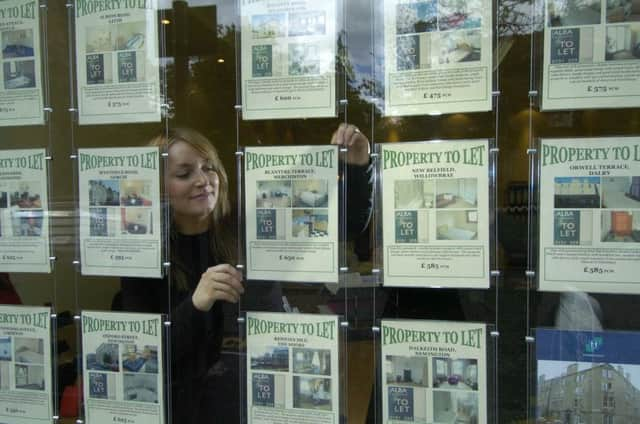Many Scots '˜can't afford one month's rent in advance when moving'


A new report calls for housing associations “to be as flexible as possible” with tenants over payment of the first month’s rent and for the Scottish Government to increase the level of support available.
It shows the average housing association month’s rent in advance for a one bed home is just over £255.
Advertisement
Hide AdAdvertisement
Hide AdWith the extension of the local housing authority cap to the social sector, charities warned this may prove problematic for younger people only eligible for the shared room rate.
Official statistics published this week found a growing number of younger Scots are already turning to the private sector for accommodation - with 40 per cent of Scots under the age of 40 renting privately in 2016, up from 13 per cent in 1999.
Shelter Scotland and the Scottish Federation of Housing Associations (SFHA) raised their concerns in a joint report, First Month’s Rent Flexibilities, following growing evidence that the roll-out of Universal Credit, changes to the way housing benefit is calculated and the benefits cap are increasing the financial pressures on many households – both in and out of work.
They fear a backlog of arrears for both tenants and housing associations which might never be paid off and could be followed by the possibility of eviction and homelessness.
Among several key recommendations was a call to have the option of only one week’s rent in advance and a call for the Scottish Government to introduce a repayable loan system to help new tenants with their first month’s rent.
Sarah Boyack of SFHA said: “This report highlights the detrimental effects that delayed Universal Credit payments are having on social landlords and their tenants. Delays to housing benefit and poor communication from the DWP places tenants in debt before their tenancy even begins.
“This situation ultimately undermines the social housing model and instead of sustaining tenancies and supporting vulnerable tenants, puts both landlords and tenants in an even more vulnerable position.”
Adam Lang, head of policy at Shelter Scotland, said: “It’s vital that homeless households and people on low incomes can find a home they can afford. Social housing provides that safety net. But one month’s rent in advance for some households is simply not affordable.
Advertisement
Hide AdAdvertisement
Hide Ad“People starting their tenancy in arrears is not in anyone’s interest, so flexible arrangements such as one week’s rent in advance or introducing repayable loans from the Scottish Government could make the difference.”